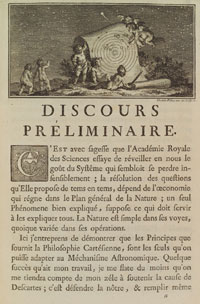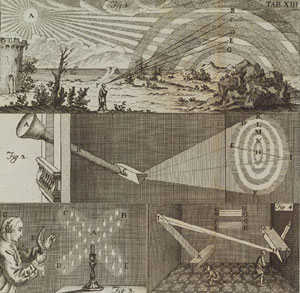Trial by Fire
 Etienne Simon de Gamaches, Astronomie
Etienne Simon de Gamaches, Astronomie
physique (Paris,
1740) –
Science,
Industry
and Business Library, NYPL
In
his old age, Newton was known to boast that he had made the Principia purposely
difficult in order to stave off “smatterers” in mathematics. He
need not have tried. The incomprehensibility of the treatise derived not simply
from the need to master a new language of mathematics or to assimilate such
a mystifying concept as action at a distance. The very theory and structure
of the Principia challenged – and often defeated – even
the very few with the requisite mathematical skills. The recondite nature of
Newton’s
language and his failure to supply proofs to various propositions were compounded
by ambiguities and inconsistencies (and some errors).
Newton’s refusal to offer a mechanical cause to account for universal
gravitation, or to provide an underlying metaphysical framework, also unsettled
his contemporaries. Accustomed to thinking about natural philosophy in terms
of causes and a priori reasoning, they bristled at Newton’s suggestion
that certain knowledge could be derived directly from the phenomena of nature,
and that there was no need to “feign hypotheses.”
 Plate from Celestino Cominale, Anti-Newtonianismi
Plate from Celestino Cominale, Anti-Newtonianismi
pars
prima
(Naples,
1754–56) – Science, Industry
and Business Library, NYPL
To
these inherent difficulties of comprehension were added chauvinistic overtones.
Newtonian ideas were as likely to be accepted or rejected along nationalistic
lines as on the merits of the case; this was true not only for the German proponents
of Leibniz, but also among Frenchmen who balked at the spectacle of the dethroning
of Descartes – the reigning scientific philosopher – by an Englishman.


